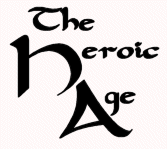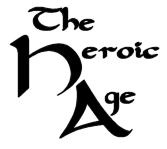Issue 14
Issue Editors: Eileen A. Joy & Andrew Rabin | November 2010
Notes from the Editors-in-Chief
The State(s) of Early English Studies: A Shared Essay Cluster with postmedieval: a journal of medieval cultural studies
Section Editor: Eileen A. Joy
Letter from the Editor
The Shock of the Old: Early English and its Modern Re-Tellings
Elaine Treharne, Department of English, Florida State University
Abstract: This essay considers the issue of adapted and new Old English poetry, as it is manifested through modern translations and poems 'after' the originals, and it also evaluates contemporary responses to new versions of the old, and contemplates how Anglo-Saxonists might exploit the popular interest in Creative Writing, particularly among graduate students. There is a wide and enthusiastic audience for Old English, who might appreciate both the original verse and its adaptations in university courses that emphasize translation and rewriting. Appended to the essay are poems by Florida State University Creative Writing graduate students, which showcase excellent translation skills influenced by a semester of learning traditional Old English literature and literacies.
Old English Literacy, the Digital Revolution, and New Media Aliteracy
Mary Dockray-Miller, Lesley University
Abstract: In light of current debates about literacy, critical thinking, and foundational knowledge in the undergraduate curriculum, this essay argues for an expansion and redirection of the discourse of Old English studies to include issues of literacy and aliteracy, language history and change, and interdisciplinary communication with professional training programs as well as other liberal arts disciplines.
Still Theoretical After All These Years, Or, Whose Theory Do You Want, Or, Whose Theory Can We Have?
Clare A. Lees and Gillian R. Overing, King's College London and Wake Forest University
Abstract: We focus on some other questions that are forestalled by the repeated posing of the question of the 'in-ness' or otherwise of theory in our field, and consider also what can we do for 'theory' rather than what it can do for us. We raise further questions about the ethics of theory in past, present, and future contexts in Old English studies.
Available in postmedieval: a journal of medieval cultural studies 1.3 (Nov. 2010) http://www.palgrave-journals.com/pmed/journal/v1/n3/index.html:
Before and after theory: Seeing through the body in early medieval England
Jacqueline A Stodnick, University of Texas-Arlington and Renée R. Trilling, University of Illinois
DOI: 10.1057/pmed.2010.35
This essay brings insights drawn from materialist theories of the body to bear on Anglo-Saxon texts with the dual aim of, first, advancing knowledge about the body in early medieval England and, second, questioning the limitations of contemporary theoretical models deeply invested in the toxicity of a post-industrial world. Providing examples drawn from Old English poetry, we argue that Anglo-Saxon uses of the body share some affinities with new materialist modes of thinking, particularly for the ways that they resist any simple severance of body from ruling consciousness.
Periodization and the matter of precedent
Kathleen Davis, University of Rhode Island
DOI: 10.1057/pmed.2010.32
This essay begins by considering the relation between medieval/modern periodization and the periodization of England's history as pre- or post-Norman Conquest, and suggests that despite significant differences these periodizations have a shared history—one that is nationalist, colonial, and fundamentally juridical. As a way of approaching the position of Anglo-Saxon studies in literary theory, the essay then examines the structure and function of legal precedent, and argues that periodization accomplishes for historical precedent what formalized institutional mechanisms accomplish for legal precedent: that is, a sorting out process that defines which elements of the past can serve as a rule for future guidance, and which cannot. Such a process of sorting and defining clearly still operates in the case of pre- and post-Conquest periodization. If periodization, like legal precedent, instantiates pasts capable of shaping or binding the future, then newly imagined futures and theoretical avenues require the disassemblage of this periodization.
Text, sex, and politics: Present and past reflections
Carol Braun Pasternack, University of California, Santa Barbara
DOI: 10.1057/pmed.2010.38
In November 2008, Proposition 8, the "California Marriage Protection Act," halted gay marriages just five months after the state's Supreme Court had ruled them protected by the state constitution. Although the proponents of Proposition 8 claim that they are protecting "traditional marriage" as understood by all cultures, faiths, and ages, this essay shows that their position intertwines religion, sexuality, and politics in a pattern that reflects the combination of values promoting chastity in late Anglo-Saxon England: both contend that a specific practice of Christianity and social adherence to their religious convictions about sexual practice are necessary to the safety of the political state. The essay also addresses the role of information technologies in the shaping of these ideas, speculating about how the shift from the hierarchical organization of the book to the more diffuse matrix of Web 2.0 may impact the governing of such ideas and social practices.
What would Byrhtwold do?
Lisa M.C. Weston, California State University-Fresno
DOI: 10.1057/pmed.2010.39
This essay engages with the discussion of possible futures for Anglo-Saxon Studies from the most material—and embattled—of places, the humanities within US public universities. Beset by budget cuts and by demands for "relevance" and "accountability" within increasingly corporatized institutions, medievalists especially can be dismissed as marginal. Yet proving oneself and one's field of research "central to University mission" often seems to require complicity with neo-liberal and anti-humanistic ideologies and cultures. At the very least it requires the adoption of the language of our oppression. But rather than compromising or merely bemoaning our fate, can we use our perceived position of marginality as a place from which to construct new theories and pedagogies of resistance (and also of pleasure)? This essay suggests that Anglo-Saxon Studies (and Medieval Studies more generally) may offer an appropriately "ex-central" position from which to formulate such utopian projects.
Themed Articles: Anglo-Saxon Law
Section Editor: Andrew Rabin
Letter from the Editor
Æthelberht's and Alfred's Two Skulls
Lisi Oliver, Louisiana State University
Abstract: This paper argues that the unique term hion in Æthelberht §36 should be interpreted as tabulum of the skull, connecting it to the use of heafod-ban in Alfred §40.
The King's Closest Counselor: The Legal Basis of Wealhtheow's Comments to Hrothgar, Beowulf 1169–87
Nathan A. Breen, DePaul University
Abstract: Treatments of Wealhtheow in Beowulf scholarship have traditionally viewed the queen either as an extension of Hrothgar, serving a ceremonial function in Heorot, or as a potentially subversive character, undermining the power structure of Heorot and creating strife. Primarily, these studies have been onomastic, cultural, or literary in nature, and have yielded great insight. However, as this essay demonstrates, the legal ramifications of Wealhtheow's speech have been largely ignored. Yet, it is within the context of Anglo-Saxon legal culture, as witnessed by the various law codes, writs, wills, and diplomas (and as supported by Germanic custom), that the queen's advice to Hrothgar concerning his informal adoption of Beowulf shows her political savvy and elevates her status within the poem, perhaps mirroring the roles of some Anglo-Saxon queens. Wealhtheow's speech recalls the primary prohibition of Hrothgar's kingship—that he should not alienate land from the kingdom or give his people away—as she skillfully protects the right to accession of the throne for her young sons.
Ealles Englalandes Cyningc: Cnut's Territorial Kingship and Wulfstan's Paronomastic Play
Jay Paul Gates, Department of English, John Jay College of Criminal Justice
Abstract: The phrase ealles Englalandes cyningc appears for the first time in I–II Cnut, and represents a shift in the discourse of Anglo-Saxon kingship, changing it from king over a people to king over a territory, redefining the discourse of nationhood.
The 'Scipmen' Scribe and Cambridge, Corpus Christi College 383
Kathryn Powell, University of Cambridge
Abstract: This article reviews the scholarship on MS Cambridge, Corpus Christi College 383 and particularly examines the case for the manuscript's St Paul's, London, origin. Based on a study of annotations, it suggests that the manuscript may have been produced elsewhere for the bishop of London and then modified at St Paul's.
Laurence Nowell's Edition and Translation of the Laws of Alfred in London, British Library Henry Davis 59
Rebecca Brackmann, Lincoln Memorial University
Laurence Nowell, a major figure in the sixteenth-century study of Old English law, laboriously gathered, transcribed, and edited Anglo-Saxon laws, eventually producing an Old English-Early Modern English edition and translation of the Laws of Alfred. Nowell's translation, examined in the context of comparable undertakings by his housemate Arthur Golding, reveals Nowell's strategies for making the Old English laws seem contemporary while still retaining their authoritative status as an object from the distant past. His manuscript's textual and visual emphasis on the royal origin of laws suggests that Nowell's presentation of Old English law as old and yet familiar also had political resonance for contemporary Elizabethan England.
On "Germanic"
Daniela Fruscione, Johann Wolfgang Goethe-Universität, Frankfurt am Main
The adjective "Germanic" originated among eighteenth-century philologists as a way of referring to the West Indo-European language group that produced modern-day German and English, as well as the Scandinavian, Celtic, Slavic, Italic, and Greek language families. It is a designation imposed from the outside, and thus corresponds neither to any self-determined denomination nor does it reflect any provable consciousness of a common Germanic identity among early northern European peoples. As recent studies of early medieval ethnogenesis have argued, without a uniform identity-consciousness among the speakers of the Germanic dialects, the denomination "Germanic" can be considered nothing other than a mere scientific convention However, if one speaks about the middle ages, one can only do so badly without it. This essay traces the history of the term "Germanic" and discusses ways in which it might be re-defined in a manner more useful for current scholarship.
Columns
The Year in Medieval Archaeology
John Soderberg, University of Minnesota
Reviews
Jurasinski, Stefan, Ancient Privileges: Beowulf, Law, and the Making of Germanic Antiquity. Reviewed by Michel Aaij.
In Memoriam
Rachel Bromwich [At The Guardian]
James J. Paxson [At The Gainesville Sun]
James M. Powell [At Syracuse.com]
Navigating This Issue
This issue utilizes simple javascripts to enhance navigation. The scripts do not add any information to users' computers (ie cookies, etc). All email addresses are encoded via javascript to prevent remote address harvesting (and hopefully cut down on spam). If you wish to email a member of the Editorial Board or an author, please enable javascripts for this site.
Each page of the issue has a "print-friendly" version, which can be accessed through the "Print" function of the browser.
This site experiences difficulties when viewed through Netscape Navigator on machines running on Mac OS 9. However, the pages view fine on either Internet Explorer or Safari.
Legal Notices
All files in this issue are offered to users free of charge for educational or personal purposes. Authors retain intellectual ownership of copyrighted material. Permission is not granted for commercial use.
All artwork on this site is copyrighted to the credited artist, and permission must be obtained from that person before the art may be used elsewhere. All uncredited artwork is believed to be in the public domain. If this is incorrect, please email the Editor-In-Chief and proper credit will be given or the artwork will be removed at once, whichever is the preference of the artist and/or the artist's legal representatives. If an image is in the public domain, feel free to download it and upload it to your own site. Please do not link directly to the image.
Staff For This Issue
- Larry J. Swain, Editor-in-Chief
- Deanna Forsman, Webdesign & Layout
- Brad Eden, Book Review Editor
- William Schipper, Archivist
Copy Editing
- Bill Hamilton
- Heather M. Flowers
- Kristin Vetter
© 2010 The Heroic Age. All rights reserved.

